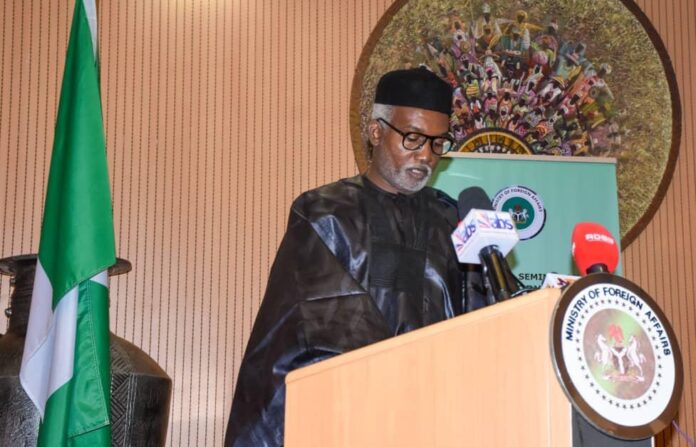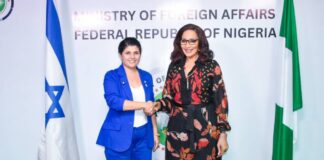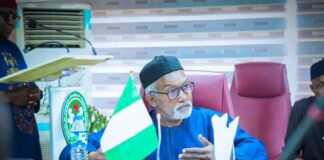By Helen Okon
Nigeria has taken a bold and significant step in enhancing its digital presence globally with the unveiling of the Cyber Diplomacy Unit, which will coordinate cyber-related foreign policy.
The Honorable Minister of Foreign Affairs, Ambassador Yusuf Maitama Tuggar, and the Attorney General of the Federation (AGF) and Minister of Justice of Nigeria, Mr. Lafeef Olasunkanmi Fagbemi (SAN), unveiled a digital and cyber diplomacy initiative set up to strengthen Nigeria’s foreign policy.
Speaking at the opening session of the Anticipatory, Cyber, and Digital Diplomacy seminar in Abuja on Tuesday, Amb. Tuggar noted that the convergence of disruptive technologies, shifting geopolitical alignments, and deepening digital interdependence is redefining the foundations of diplomacy.
He emphasized that artificial intelligence and quantum computing, along with the geopolitics of data and the militarization of cyberspace, are fundamentally rewriting the nature of statecraft right before our eyes, and Nigeria must not be a mere bystander.
“We must act with purpose to position ourselves as a principled, capable, and forward-looking actor in the evolving global digital order.
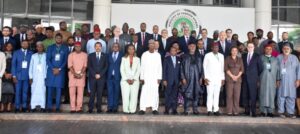
“This requires embedding anticipatory cyber and digital diplomacy into the core of our foreign service, our national security architecture, and our multilateral engagements,” Tuggar said.
Amb. Tuggar emphasized that anticipatory diplomacy enables us to identify early warning signals, predict systemic shocks, and plan strategically for the future, whether in the global race for critical minerals, the regulation of artificial intelligence, or the restructuring of global supply chains.
“Our diplomats must be trained not merely to react but to influence events before they unfold,” he said.
Amb. Tuggar emphasized that cyber diplomacy involves how we respond to and establish global standards to combat cybercrime and cyber warfare. It also covers how we balance national sovereignty with bilateral treaties and multilateral cooperation. Additionally, it includes how we work with our partners to address malicious activities, protect critical infrastructure, and support the integrity of elections and other interests that are vital to peace, stability, and progress.
Amb.Tuggar added that cyber diplomacy revolves around collaboration on data privacy, Internet freedom, and information control. It involves working together on capacity building and sharing expertise.
“New global investment in the next generation of innovation reached $100 billion last year, an 80% increase from 2023. This does not, as you might imagine, specify how much of that investment is in our region. As the U.S. Secretary General has said, it must also mean “Africa included” when we say AI,” Tuggar said.
Tuggar stated that the last government found itself searching for agreement with partners in Europe to tackle hate speech.
“At one point, a major social media platform was suspended. More recently, when technology got ahead of regulation, crypto provided a safe financial space for kidnappers, violent extremists, organ traffickers, and other criminals. Billions of dollars left the country in the first quarter of 2024.
These are the real-world consequences of the changes we see. Lives lost, futures ruined, and an anonymous few hijacking the welfare of the many. Viral but fake memes of leaders romancing rock stars and viral but fake reports of coups and deaths,” Tuggar said.
Amb. Tuggar noted that people no longer know what to believe, which is a short step away from believing nothing. Laws and regulations are important but typically behind the digital curve.
He emphasized that the purpose of cyber diplomacy is to help systems catch up and promote the best technology can do to accelerate growth, stability, and freedom.
“In the spirit of this forward-looking vision, the Ministry of Foreign Affairs has established a dedicated cyber diplomacy unit.
The unit’s mandate is clear: to coordinate Nigeria’s cyber-related foreign policy across all diplomatic platforms, build capacity for cyber negotiations, champion ethical and inclusive digital governance, foster public-private partnerships for national cyber resilience, and ensure that Nigeria’s voice is influential in global cyberspace governance
We can learn from parallel initiatives, like the 2018 Paris Call for Trust and Security in Cyberspace or the EU’s Cyber Diplomacy Toolbox. The UN has developed cyber protocols, and we have the Malabo Convention as well as the African and Global Digital Compact
We know the challenges are urgent and delicate. We face state-sponsored hacking as well as hacking from criminal and non-state actors. In other parts of the world, healthcare has been paralyzed, and other critical infrastructure has been threatened,” Tuggar said.
He said that Nigeria’s foreign policy must adapt to a world where private technology firms often wield more influence than sovereign states and where digital platforms can shape public opinion, economic outcomes, and even conflict dynamics.
He emphasized that as Nigeria seeks greater influence within ECOWAS, the African Union, and the United Nations, Nigeria’s engagement must be anchored in sovereignty, trust, and innovation.
“We must lead Africa’s digital future, training a new generation of cyber negotiators, expanding regional incident response capabilities, and championing African-led solutions to global digital challenges. This includes advancing climate-conscious data practices and ethical AI development
“The private sector, banks, telecommunications companies, fintechs, and startups must play a critical role as frontline partners in protecting Nigeria’s digital interests. The Nigerian diaspora, rich in expertise and global networks, must also be integrated into our cyber and digital diplomacy strategies,” Tuggar stated.
The minister announced the creation of the Anticipatory Cyber and Digital Diplomacy Masterclass Series for Diplomats from Africa and the Global South, which will be freely accessible on YouTube, describing it as Nigeria’s digital gift to the world. A platform designed to build a global competitive diplomatic corps.
“Our agenda is also one of inclusion. Women and youth must be central actors, not peripheral participants, in Nigeria’s cyber diplomacy. Their perspectives and innovations are essential to building a representative and resilient policy framework,” Tuggar said.
“There is an African proverb that says, ‘Tomorrow belongs to those who prepare for it today,” Tuggar said.
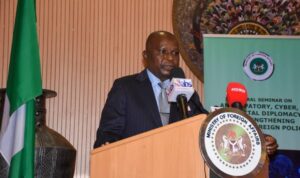
The Attorney General of the Federation and Minister of Justice underscored the need for a proactive approach to developing and negotiating international norms and standards for cyberspace
“As Nigeria’s Chief Law Officer, the Federal Ministry of Justice is positioned to address this new reality with strategies that are proactive, technologically astute, and ethically grounded.
“Anticipatory diplomacy is a proactive strategy that moves beyond reacting to crisis. It involves developing the foresight to identify and address potential challenges before they escalate,” Fagbemi said.
Fagbemi emphasized that cyber diplomacy requires a forward-looking legal and policy framework that can effectively manage the impact of rapidly emerging technologies.
Also policy frameworks that address legal, security, and ethical issues such as data governance, artificial intelligence, and cybersecurity.
“It is clear that cyber threats pose a danger to national infrastructure and the rule of law. A legal framework must, therefore, be robust enough to deter cybercrimes, enforce justice, and foster international cooperation to protect digital sovereignty,” Fagbemi said.
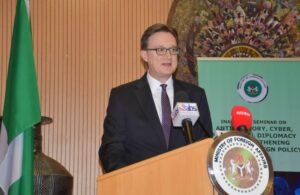
The British High Commissioner, Mr. Richard Montgomery, noted that the UK’s cyber diplomacy with Nigeria is part of a broader security and defense partnership. He highlighted that in February of last year, Nigeria and the UK signed a new MOU on cybersecurity, which has led to a significant increase in collaboration between the two countries.


